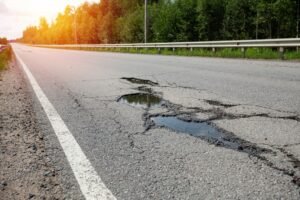
Yes, you can sue a city agency for road defect accidents in Miami. However, Florida’s sovereign immunity laws require proving the city had actual or constructive notice of the dangerous condition and failed to repair it within a reasonable time. You must also file a notice of claim within three years of the accident.
A knowledgeable Miami car accident lawyer from Anidjar & Levine can help you meet the complicated legal requirements for suing government agencies. We can also determine whether you have a viable claim against the city.
Road defect cases against municipalities require different legal strategies and evidence from standard car accident claims, making experienced legal guidance essential for protecting your rights.
Understanding Sovereign Immunity in Florida
Sovereign immunity historically protected government entities from most lawsuits, but Florida law now allows certain claims against cities and counties for dangerous road conditions. However, these exceptions come with strict requirements that don’t apply to lawsuits against private parties.
Cities can still claim immunity if they can prove they had no actual or constructive notice of the dangerous condition, or if they can demonstrate they took reasonable steps to remedy the problem within a reasonable time after gaining knowledge of it.
The burden of proof is higher in cases against government entities, requiring clear evidence that the city knew or should have known about the dangerous condition and failed to address it properly.
Types of Road Defects That May Support Claims
The following road conditions can form the basis for successful claims against Miami city agencies when they create unreasonable dangers for drivers and pedestrians.
- Structural Road Problems: Potholes, uneven pavement, cracked roadways, deteriorated road surfaces, improper drainage causing standing water, and inadequate road design or construction defects can all support liability claims if the city had noticed and failed to repair them.
- Traffic Control Deficiencies: Missing or obscured traffic signs, malfunctioning traffic lights, inadequate lane markings or road striping, missing guardrails or barriers, and improperly designed intersections may create city liability when they contribute to accidents.
- Maintenance Failures: Overgrown vegetation blocking signs or sightlines, debris left on roadways after construction, inadequate snow or ice removal, and failure to maintain proper road lighting can establish municipal liability under appropriate circumstances.
The key factor is whether the condition created an unreasonable danger that the city knew about or should have discovered through reasonable inspection and maintenance practices.
Notice Requirements for Government Claims
Florida law imposes strict notice requirements for claims against government entities that differ significantly from standard personal injury cases. These requirements exist to give cities fair warning and opportunity to investigate allegations before formal lawsuits begin.
You must provide written notice of your claim to the appropriate city department as soon as possible after the accident, and there is a tight deadline to file your notice. The notice must include specific information about the accident, your injuries, the dangerous condition that caused the accident, and the damages you’re seeking.
Required Notice Contents
Notice requirements include:
- The exact location where the accident occurred
- Date and time of the incident
- Detailed description of the dangerous road condition
- How the condition caused your accident and injuries
- Names and contact information for witnesses
- Description of all injuries and property damage sustained
- Amount of damages being claimed
If you wish to sue a city agency for road defect accidents in Miami, it’s best to work with a lawyer with experience in these cases. They can make sure you meet the notice requirements in time.
Proving Municipal Liability for Road Defects in Miami
Successfully suing a city agency requires proving elements that don’t apply to typical car accident cases. The legal standard focuses on the city’s knowledge of the dangerous condition and its response to that knowledge. Their level of knowledge can fall into multiple categories, including:
- Actual Notice: Proving actual notice means demonstrating that city employees, contractors, or officials knew about the specific dangerous condition through direct observation, citizen complaints, work orders, inspection reports, or previous accident reports at the same location.
- Constructive Notice: Constructive notice means the dangerous condition existed long enough that reasonable inspection and maintenance would have discovered it. This typically requires expert testimony about proper municipal maintenance standards and evidence about how long the condition existed.
The city’s maintenance records, inspection schedules, citizen complaint logs, and work order histories become crucial evidence in establishing notice. Cities that fail to maintain proper inspection and maintenance programs may face higher liability exposure.
You must also prove that the dangerous condition was the proximate cause of your accident and that the city had a reasonable opportunity to remedy the condition after gaining notice.
Common Defenses Cities Use in Road Defect Cases
Municipal defendants have access to defenses not available to private parties, requiring strategic preparation to overcome their arguments and secure fair compensation. Here are some frequently used defenses:
- Immunity Claims: Cities may argue they retain immunity because they lacked notice of the dangerous condition or because they took reasonable corrective action within an appropriate timeframe after learning of the problem.
- Design Immunity: Florida law may protect cities from liability for road design decisions that followed approved engineering standards at the time of construction, even if those standards later prove inadequate.
- Discretionary Function Immunity: Cities may claim immunity for policy-level decisions about resource allocation, maintenance priorities, and budget constraints that affect road maintenance schedules.
Get Help Suing a City Agency for Road Defects in Miami
At Anidjar & Levine, we understand the legal challenges involved in holding government entities accountable for dangerous road conditions that cause serious accidents and injuries.
Contact us today for a free consultation to discuss what happened and learn whether you have grounds for a claim for your road defect accident in Miami. We’ll investigate the dangerous condition, gather the necessary evidence, handle all notice requirements, and fight to ensure you receive fair compensation for your injuries and damages.










